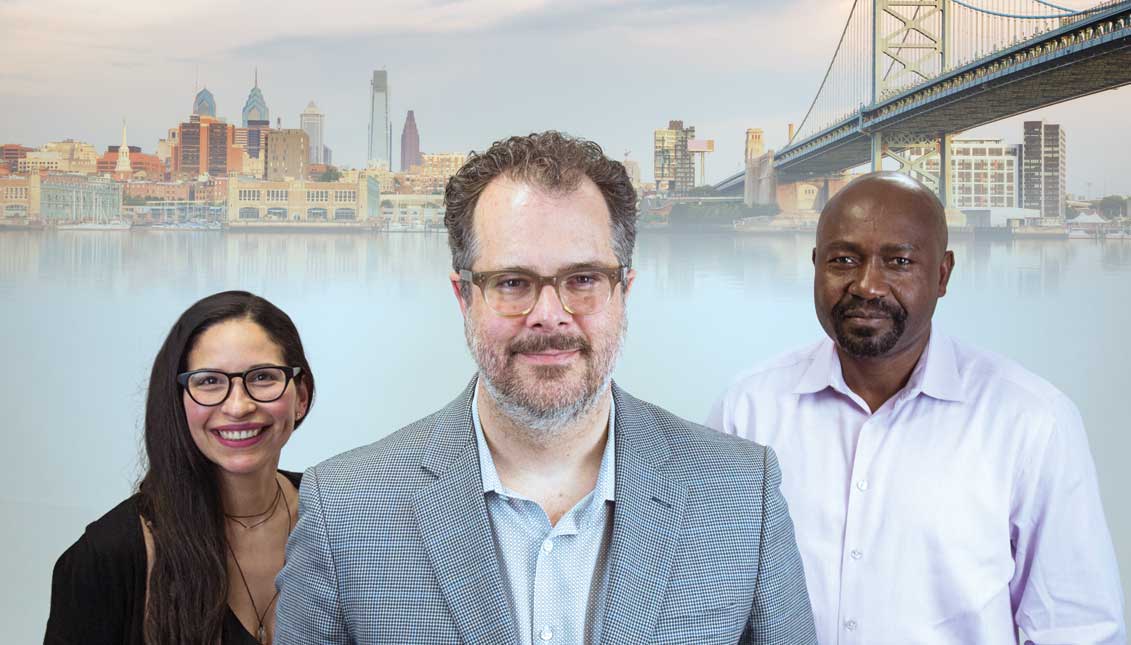
Welcoming immigrants: The work of key makers
For 15 years, the Welcoming Center for New Pennsylvanians has helped immigrants integrate into the labor market in Philadelphia so they can contribute to the…
Being a city with open doors and opportunities for immigrants is in Philadelphia’s very DNA. Since its founding on Oct. 27, 1682, the city has been a center of welcome and coexistence among people who think, dress, speak, and worship differently.
At the core of Philadelphia’s values is a simple idea: inclusion as a road to development and progress. However, the city’s doors have not always been open to all. This contradiction in principles and practice is what gave birth to the Welcoming Center for New Pennsylvanians, founded in 2003 by Anne O’Callaghan.
O’Callaghan arrived in Philadelphia in 1970 from Ireland. Her objective was to practice her profession as a doctor in a region which, despite the fact that it suffered from a lack of trained medical personnel, presented many obstacles for doctors who had trained in other countries to practice in Pennsylvania.
It took O’Callaghan three years to obtain a license to practice her profession here in Philadelphia. In 2003, she created the Welcoming Center with the goal of facilitating processes for immigrants who, though they worked as professionals in their countries of origin, were obligated to work the first job that came along here in the U.S. simply because they were not seen as qualified for professional positions.
In 2018, the center is celebrating its fifteenth year serving as a bridge between immigrants and the job market, and affecting many people’s lives as a center of support and training so that foreign professionals are able to make their dreams a reality while contributing to the region’s overall progress.
Philadelphia’s title as the City of Brotherly Love does not in and of itself explain why it continues to be an attractive destination for immigrants despite the fact that it has the highest poverty rate of any large city in the country, at 25.3 percent.
Around 1.6 million people live in Philadelphia. According to projections from the census, 13 percent of the population are immigrants: about 205,000 city residents who were born in another part of the world have decided to build their home here, reversing the population loss the city suffered in the past 50 years of deindustrialization.
"There is a global competition that’s happening among the cities to become the most welcoming.”
The Pew Research Center estimates that of those 205,000 Philadelphians who are immigrants, between 50,000 and 60,000 are undocumented. A study from the New American Economy demonstrated that immigrants in Philadelphia are 43.1 percent more likely to start their own business than their states-born counterparts, and more than 40,000 foreign-born entrepreneurs play a fundamental role in local economic development.
A report from the Fiscal Policy Institute and Americas Society/Council of the Americas confirms the profound impact that immigrant communities have had here. According to the study “Bringing Vitality to Main Street: How Immigrants Small Businesses Help Local Economies Grow,” foreign entrepreneurs have an 18 percent participation rate in the growth of local small businesses, and are overall more likely to open their own business.
Between 2000 and 2013, immigrants opened 96 percent of all new companies and small businesses in neighborhood and commercial corridors in the city. In 2013, 28 percent of small businesses were owned by an immigrant.
Even if these types of micro-businesses (stores, restaurants, hair salons, laundromats, etc.) do not necessarily represent investment of huge amounts of capital, their impact in revitalizing once impoverished neighborhoods is unquestionable. Of the billions of dollars earned by micro-entrepreneurs in the city, $295 million is produced by immigrant entrepreneurs.
What Mexican immigrants have done with the Italian Market, how Asian immigrants have transformed various parts of Washington Avenue, and the revitalization that has happened on North Fifth Street are just a few examples of what immigrants are capable of doing in order to overcome poverty.
According to the study by the New American Economy, in 2014 immigrants in the Philadelphia metropolitan area contributed $6 billion in taxes and boasted a purchasing power of $13.5 million.
None of these achievements would have been possible without a public policy that promoted the integration of immigrants into the city’s economic and cultural life.
By providing services to more than 16,000 foreign-born residents, helping to connect 2,300 of those people with employment, and advising 800 entrepreneurs, the Welcoming Center for New Pennsylvanians has played a vital role in changes the city has experienced. From programs that range from technical support for micro-entrepreneurs to training international professionals, the work of the center resembles that of a locksmith: opening doors that have stayed closed for decades to many people.
Peter Gonzales, the president and CEO of the Welcoming Center, knows as much as anyone that effectively integrating the immigrant population is a matter of life or death for cities like Philadelphia in an ever more globalized world.

“Creating a space that is welcoming is really important for global competition. On an economic level, you are as a city competing for human resources, for economic resources, and there is a global competition that’s happening among the cities to become the most welcoming,” Gonzales affirms.
While explaining, he states that “cities are recognizing that immigrants are helping to drive a lot of the innovation. Cities are known for being dynamic places where there are opportunities for a lot diverse ideas to come together and create new solutions to some of the old problems that we have.”
“The process has been tough, especially when I came here I didn’t speak a word of English, so that was the first struggle.”
One of the enduring problems is the standardization for professional degrees obtained abroad. Just as O’Callaghan experienced in 1970, thousands of immigrants are still forced to navigate a legal labrinth — and processes which require significant amounts of time and money — to be able to acquire their credentials in the United States.
“Connecting with them is a challenge because of the way HR systems now work with… If you have this experience but you apply online and fill out an application… you [are] never going to get passed because you’re not even sure about how to fill out the first step,” Gonzales explains.
RELATED CONTENT
Irene Contreras has weathered this difficult journey. Despite having 10 years of professional experience in her home country of Venezuela before arriving in the U.S. in 2014, she has had to sort through an endless amount of obstacles to be able to locate stable work.

“The process has been tough, especially when I came here I didn’t speak a word of English, so that was the first struggle,” the communications expert and journalist says.
Discouraged by the challenges of resituating herself in the local job market, Contreras knocked on the door of the Welcoming Center at the beginning of this year. There, she found a human team who was ready to help her break through the social and professional isolation that recently-arrived immigrants often experience.
After studying for two weeks in the International Professionals Program, Contreras learned about aspects of the U.S. professional world that she was previously unaware of, from how to write a cover letter to how to perform well in job interviews — all while improving her English.
Today, Contreras combines her work as a social media manager for a few Latino-owned restaurants with that of translator for a law firm. She has also recovered her self-confidence and now feels as Philadelphian as any other resident.
Gonzales highlights the fact that experiences such as Irene’s are possible in an inclusive environment, and although Philadelphia has a good set of welcoming policies, it still has far to go in changing the stereotype that those that arrive from a different country who don’t speak English are “less intelligent,” or are lacking the necessary credentials to be employable.
For the center’s Director of Entrepreneurship and Innovation Herman Nyamunga, it is clear that if the city wants to maintain stable economic and demographic growth, it has to offer more tools to immigrant entrepreneurs who want to open more businesses but are often unable to find financial support to carry out their projects.
“Most of the institutions that give money are relied on credit rating and that is something that many immigrants do not have,” he says. According to Nyamunga, the city needs to implement policies that enable financial entities to extend microcredit to foreign-born entrepreneurs.
“With globalization taking root in the world, capital can move from place to place. Entrepreneurship and capital tend to follow the same path and they end up at places that are welcoming,” Nyamunga concluded.
For the time being, the Welcoming Center is preparing to launch its Global Startup Accelerator, an initiative in partnership with the University City Science Center to help local startups concretize their international business plans; a stage on which immigrant entrepreneurs are without a doubt the central protagonists.











LEAVE A COMMENT:
Join the discussion! Leave a comment.